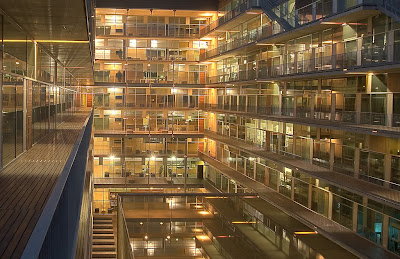
Today is Good Friday in whatever is called the "western christianity".
I am starting to get a bit superstitious with the observation (or fact?) that Good Friday tends to be cloudy no matter if it's March, April or May, if it's a Catholic "Good" one or an orthodox "Big" one. Then my well-hidden scientific side rises on the surface with a profoundly sound argument which claims that since we are talking about a whole day and since it is practically impossible that a whole day remains cloudy all over the world we have to be talking about an observer-biased phenomenon. Meaning Good Friday looks to be always cloudy to me, wherever I am, and perhaps to my mother, whose superstition can only be traced back to this same observation, every year.
In any case, cloudy or not, Good Friday in a Catholic country like Spain is a holiday, which means I should be having my siesta instead of seeping coffee in the lab. Nonetheless, here I am, trying to organize my stuff before I leave for my real holiday in order not to come back in 10 days realizing I don't even remember in which folder I keep my e-mail messages, a useful -though admittedly boring- practice I learned from my previous boss Yannis. But it somehow looks that neither today's blue and moody weather nor my slightly hang-overed head can help me in carrying out this task with the minimal decency. Instead I am reading poems by Miguel Hernandez, as a tribute to today's international poetry day, I browse lyrics on the web and keep blogging with musical references. Whoever notices the subtle one in this post, as compared to the immediate previous one, shall irrevocably earn my admiration.
By the time the evening approaches and my need for a late siesta can only be battled against with a huge mug of the lab's strongest coffee, I start putting stuff into order. I sent the last updates to our collaborators, sure they want read them today and supposing they want care even when they eventually do. Then I organize my shell terminals with tags denoting the project I am working on each, thinking that I am doing it (and writing about it) just to piss off Julien and Sylvain ....(got You!). Next I post my to-do list on my google calendar and pile up properly the -mostly unread- papers on my desk. I am left with a bunch of small scripts lying around on my desktop, tiny unfinished lines of code, striving to accomplish a function which lingers undecided, desperately trying to reach the end of the loop while self-aware of their rough-hewed ends. As I try to browse through this incomprehensible stream of dos and whiles it seems to me like I am reading geeky, surrealist poetry of the strangest kind.
Then, disgusted of myself for having dared to think of such an obscene metaphor, afraid of Sylvain preparing his geek-card all the way from North California, I decide to send most of it to the recycle bin, or in any case away from my screen. I am stuck in front of the last one, which is supposed to solve a simple problem but in the fastest possible way. I slightly tilt my head to get a better view of it, thinking that I should be looking like one of this apes of the "Space Odyssey" upon facing the famous black column. Which reminds me of the news of Arthur Clarke's death, which reminds me that it's a long time since I last listened to some classical piece I really like from that great Kubrick film, which, which, which.... the series of digressions can now only compare to my friend Filipe's thoughts. I am confused....
No I am not. I just realize that today is not a day to work. Before I finally leave the lab for good for the coming ten days, I take a last look at my script and decide it would be nice if I placed it somewhere it wouldn't be lost, but without getting in my way all the time. And I guess I 'll leave it there, at the back of my mind, like a small riddle, like this pair of snickers hanging from a power cord in Barceloneta, which Julien captured one day, so insightful of the small everyday problems of a poor bioinformatician at the verge of a nervous breakdown.
It's closing time. I am off to Greece.

